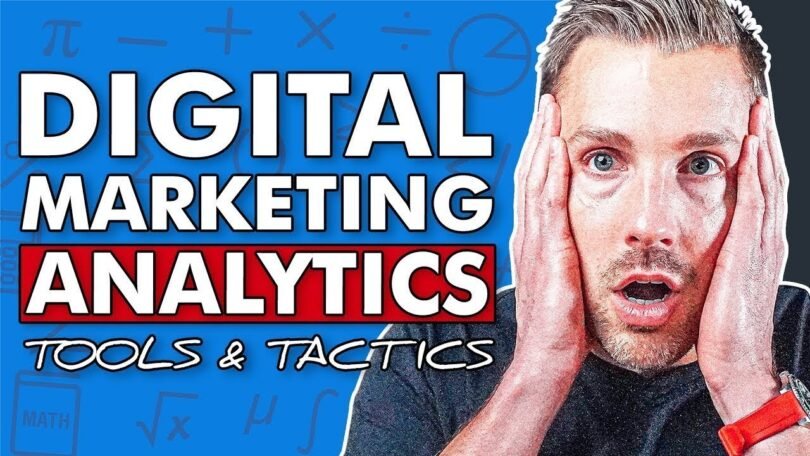Digital Marketing Analytics
In today’s digital-first world, digital marketing analytics has become a cornerstone of successful marketing campaigns. With a wealth of data available at your fingertips, businesses can now make more informed decisions, optimize campaigns in real-time, and understand customer behavior like never before. But what exactly is digital marketing analytics, and how can you use it to your advantage? Let’s dive deep into this essential marketing tool.
Introduction to Digital Marketing Analytics
Definition and Importance
Digital marketing analytics refers to the process of analyzing the performance of your online marketing efforts using various data-driven tools and techniques. It’s all about collecting, processing, and interpreting data to make more informed decisions that lead to better marketing outcomes.
Why is this important? Because, in a world where every click, impression, and conversion can be tracked, businesses that ignore analytics risk missing out on valuable insights that can propel their strategies forward.
Role in Modern Marketing Strategies
In modern marketing, data is everything. Analytics allows businesses to track their campaigns, understand their audience, and make data-driven decisions. It’s not just about vanity metrics like likes and shares; it’s about uncovering actionable insights that can drive revenue and growth.
The Evolution of Digital Marketing Analytics
From Traditional Marketing to Digital Analytics
Before the rise of digital, marketing was largely based on gut feelings and estimations. Now, with digital analytics, marketers can quantify their efforts with precision. This shift has allowed for more accountability and has elevated the role of marketing from a cost center to a revenue driver.
Key Milestones in the Development of Analytics
The journey of digital marketing analytics has seen major milestones, such as the introduction of Google Analytics in 2005 and the rise of AI-driven tools that provide real-time data. These advancements have transformed how businesses approach marketing.
Key Components of Digital Marketing Analytics
Data Collection
The foundation of digital marketing analytics lies in collecting data. This can come from various sources, such as website traffic, social media interactions, and paid advertising.
Data Processing and Analysis
Once the data is collected, it needs to be processed and analyzed to extract meaningful insights. This is where tools like Google Analytics come into play, helping businesses turn raw data into actionable information.
Actionable Insights
The goal of analytics isn’t just to collect data for the sake of it. It’s about understanding what that data means and how you can use it to improve your marketing efforts.
Why Digital Marketing Analytics Matters
Data-Driven Decision Making
One of the biggest benefits of digital marketing analytics is its ability to support data-driven decision-making. By analyzing the results of your campaigns, you can make adjustments that lead to better performance.
Measuring Campaign Effectiveness
Without analytics, there’s no way to measure the effectiveness of your marketing campaigns. Metrics like conversion rates and ROI help you understand what’s working and what isn’t, allowing you to refine your strategy.
Customer Behavior Understanding
Digital marketing analytics also offers insights into customer behavior. You can track how visitors navigate your website, which products they’re interested in, and how they engage with your content, enabling you to tailor your marketing strategies accordingly.
Types of Digital Marketing Analytics
Descriptive Analytics
This type of analytics looks at what has happened in your marketing efforts. It’s retrospective and helps you understand past performance.
Predictive Analytics
Predictive analytics uses historical data to predict future outcomes. By analyzing trends, businesses can forecast future performance and adjust their strategies proactively.
Prescriptive Analytics
This is the most advanced form of analytics, where the system not only predicts what will happen but also recommends the best course of action based on the data.
Common Tools for Digital Marketing Analytics
Google Analytics
Google Analytics is the go-to tool for most marketers. It offers a wide range of features that allow businesses to track website performance, traffic sources, and user behavior.
SEMrush
SEMrush is a powerful SEO tool that also provides insights into paid advertising, social media, and content marketing analytics.
HubSpot Analytics
HubSpot offers a full suite of marketing analytics tools that provide insights into every aspect of your marketing efforts, from website traffic to email campaign performance.
Metrics to Track in Digital Marketing Analytics
Traffic Metrics
Understanding where your traffic is coming from is essential. Tracking metrics like bounce rate and session duration can help you assess the quality of your website visitors.
Conversion Rates
Conversion rate is one of the most critical metrics in digital marketing. It tells you how effective your marketing campaigns are at turning visitors into customers.
Customer Acquisition Costs (CAC)
This metric helps you understand how much it costs to acquire a new customer. By tracking this, you can optimize your budget and reduce costs.
Return on Investment (ROI)
At the end of the day, your marketing efforts need to generate a positive ROI. Analytics helps you track your returns and identify areas where you can improve.
The Role of SEO in Digital Marketing Analytics
Tracking Organic Traffic
SEO and analytics go hand
-in-hand. By tracking organic traffic, businesses can understand how well their SEO efforts are performing. This data can be used to adjust keyword strategies, optimize content, and improve overall search engine rankings.
Measuring Keyword Performance
Analytics tools allow you to track which keywords are driving traffic to your site. By measuring the performance of these keywords, you can optimize your content to target the most effective ones.
Social Media Analytics and Its Role in Digital Marketing
Popular Social Media Platforms for Analytics
Platforms like Facebook, Instagram, Twitter, and LinkedIn provide built-in analytics tools that allow businesses to track engagement, reach, and follower growth. These insights can help refine social media strategies and improve audience targeting.
Understanding Engagement Rates
Engagement metrics, such as likes, comments, and shares, show how your audience is interacting with your content. These metrics are vital for assessing the effectiveness of your social media campaigns.
How to Use Digital Marketing Analytics for Campaign Optimization
A/B Testing
A/B testing involves comparing two versions of a marketing asset (such as an ad or landing page) to determine which performs better. Analytics allows you to track the results and choose the best-performing option.
Real-time Data Adjustments
One of the biggest advantages of digital marketing analytics is the ability to make real-time adjustments. If a campaign isn’t performing as expected, you can quickly pivot your strategy based on the data you’re collecting.
Challenges in Digital Marketing Analytics
Data Overload
With so much data available, it can be overwhelming to know where to focus your efforts. Prioritizing the right metrics is key to avoiding data overload and staying focused on what matters most.
Accuracy and Reliability
Ensuring the accuracy and reliability of your data is crucial. Inaccurate data can lead to poor decisions, so it’s essential to use trusted tools and methodologies for data collection and analysis.
Privacy Concerns
As businesses collect more data on consumers, privacy concerns have grown. Marketers must ensure they comply with regulations such as GDPR and respect users’ privacy.
The Future of Digital Marketing Analytics
Artificial Intelligence and Machine Learning in Analytics
AI and machine learning are poised to transform digital marketing analytics. These technologies can analyze massive amounts of data in real time, providing businesses with deeper insights and predictive capabilities.
Predictive Analytics Advancements
As predictive analytics continues to evolve, businesses will be able to anticipate customer behavior with greater accuracy. This will allow for more personalized marketing efforts and improved customer experiences.
Digital Marketing Analytics in E-commerce
Enhancing Customer Journeys
In the e-commerce space, analytics can be used to track every step of the customer journey. By understanding how customers move through the buying process, businesses can optimize their websites and marketing strategies to improve conversion rates.
Personalization through Analytics
Personalization is a growing trend in digital marketing, and analytics plays a key role in making it possible. By tracking customer preferences and behaviors, businesses can deliver personalized experiences that drive engagement and sales.
Best Practices for Implementing Digital Marketing Analytics
Defining Clear Objectives
Before diving into analytics, it’s essential to define clear marketing objectives. Whether it’s increasing website traffic or improving conversion rates, having well-defined goals will help guide your data collection and analysis efforts.
Setting Up a Robust Tracking System
To get the most out of your analytics, it’s important to set up a robust tracking system. This includes using tools like Google Analytics and setting up tracking pixels to ensure you capture all relevant data.






